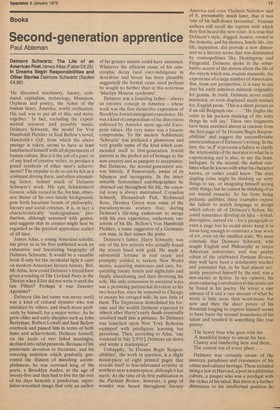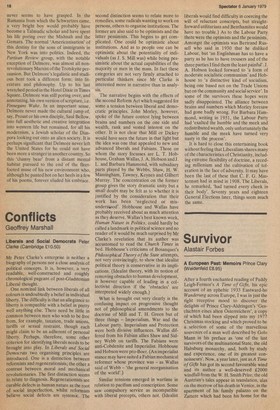Second-generation apprentice
Paul Ableman
Delmore Schwartz: The Life of an American Poet J ames Atlas (Faber £8.25) In Dreams Begin Responsibilities and Other Stories Delmore Schwartz (Secker £4.90) 'He discussed machinery, luxury, command, capitalism, technology, Mammon, Orpheus and poetry, the riches of the human heart, America, world civilisation. His task was to put all of this, and more, together.' In fact, excluding the experimental sciences and possibly music, Delmore Schwartz, the model for Von Humboldt Fleisher in Saul Bellow's novel, Humboldt's Gift, from which the above passage is taken, seems to have at least familiarised himself with all departments of human culture. But is it the job of a poet, or of any kind of creative writer, to produce a grand synthesis of other men's achievements? The impulse to do so can be felt as a continual driving force, and often attenuating factor, behind much of Delmore Schwartz's work. His epic Schwarmerei Genesis, while rooted in the, for him, obsessive theme of his own family background, puts forth luxuriant fronds of philosophy, literary and social criticism. It is, in fact, a characteristically 'undergraduate' production, although seasoned with genius, and suggests that its creator might best be regarded as the greatest apprentice author of all time.
James Atlas, a young American scholar, has given us as his first published work an exhaustive and fascinating biography of Delmore Schwartz. It would be a valuable book if only for the incidental light it casts on modern American literary history. But, Mr Atlas, how could Delmore's friend-have given a reading of The Cocktail Party in the Thirties when Eliot did not write it until the late Fifties? Perhaps it was Sweeney Agonistes?
Delmore (his last name was never used) was a kind of cultural dynamo who was mistaken by others, and much more perilously by himself, for a major writer. As he grew older and early disciples such as John Berryman, Robert Lowell and Saul Bellow overtook and passed him in terms of both fame and achievement, Delmore himself, on the heels of two failed marriages, declined into rabid paranoia. Because of his passionate devotion to literature, and his towering ambition which gradually generated the illusion of matching accomplishment, he was crowned king of the poets, a Brooklyn Auden, at the age of twenty-five and thus had to live for the rest of his days beneath a ponderous, superlative-wreathed image that only an author of far greater stature could have sustained. Whatever the efficient cause of his catastrophic decay (and over-indulgence in dexedrine and booze has been plausibly suggested) the formal cause need perhaps be sought no further than in this notorious 'Marilyn Monroe syndrome'.
Delmore was a founding father — always an emotive concept in America — whose work was the first distinctive expression of Brooklyn-Jewish immigrant experience. He was a kind of compendium of the distortions enforced by America upon age-old European values. His very name was a bizarre compromise. To the ancient Ashkenazic 'Schwartz' was prefaced a glamorous and very gentile name of the kind which commended itself to first-generation Jewish parents as the perfect act of homage to the new country and as passport to acceptance. But Delmore, the second-generation son, was bitterly, if humorously, aware of its falseness and incongruity. In the interminable fictionalised autobiographies he churned out throughout his life, the essential irony is always maintained. Cornelius Schmidt, Shenandoah Fish, Richmond Rose, Hershey Green were some of the pseudonymous avatars that, during Delmore's life-long endeavour to merge with his own experience, underwent variations of his life. Bellow's Von Humboldt Fleisher, a name suggestive of a Germanic con man, in fact misses the point.
Delmore's father, Harry Schwartz, was one of the few arrivals who actually found the streets lined with gold. He made a substantial fortune in real estate and promptly yielded to rackety New World mores, acquiring mistresses and cars, frequenting luxury hotels and nightclubs and finally abandoning and then divorcing his wife. His only concession to ancestral ways was a persisting patriarchal devotion to his two boys but, since he removed to Chicago to escape his enraged wife, he saw little of them. The Depression demolished his fortune and the wealth Delmore expected to inherit after Harry's early death eventually resolved itself into a pittance. So Delmore, was launched upon New York Bohemia equipped with prodigious learning but penurious. Then, according to Atlas, 'one weekend in July [19351 Delmore sat down and wrote a masterpiece'.
Unhappily, 'In Dreams Begin Responsibilities', the work in question, is a slight mood-piece of eight printed pages that reveals itself to less-infatuated scrutiny as nowhere near a masterpiece, although it has merit. At the time of its first publication in the Partisan Review, however, a gasp of wonder was heard throughout literary America and even Vladimir Nabokov said of it, presumably much later, that it was 'one of his half-dozen favourites'. Veteran authors still recall the rapture with which they first heard this new voice. It is true that Delmore's style, dogged, honest, rooted in the demotic, and his themes, family life, city life, aspiration, did provide a new dimension to a literary scene that was dominated by cosmopolitans like Hemingway and Fitzgerald. Delmore spoke in the rebarbative accent of the streets about the life of the streets which was, mutatis mutandis, the experience of a large number of Americans. But, from our perspective, it is easy to see that his early admirers mistook originality for genius. In truth, Delmore never really mastered, or even displayed much instinct for, English prose. 'This is a silent picture as if an old Biograph one. . . "He jingles the coins in his pockets thinking of the witty things he will say.' These two fragments have been snatched almost at random from the first page of 'In Dreams Begin Responsibilities' and suggest the uncomfortable amateurishness of Delmore's writing. In the first, the 'as if' represents a failure to clarify the relationship of the narrator to what he is experiencing and is also, to say the least, inelegant. In the second, the author confuses what he knows with what his character knows, or rather could know. The man jingling coins might be thinking up witty things to say, or imagining himself saying witty things, but he cannot be thinking of as yet unsaid remarks. So far from being pedantic quibbles, these examples expose the failure to match language to design which infects all of Delmore's fiction. He could sometimes develop an idea — lyrical, descriptive, surreal etc — for a paragraph or even a page but he could never keep it in focus long enough to construct a true work of art, even on the smallest scale. We must conclude that Delmore Schwartz, who taught English and Philosophy at major American universities and was poetry editor of the celebrated Partisan Review, may well have been a satisfactory teacher and journalist but, as he had almost certainly perceived himself by the end, was a non-starter at fiction. In my opinion, his most enduring contribution to literature can be found in his poetry. He wrote a vast amount of it and a vast amount of what he wrote is little more than word-music but now and then the sheer power of his thwarted longing to express himself seems to have burst the normal boundaries of his talent and resulted in something like true poetry: The heavy bear who goes with me A manifold honey to smear his face, Clumsy and lumbering here and there, The central ton of every place. . .
Delmore was certainly aware of the nuances, paradoxes and resonances of his ethnic and cultural heritage. These included being a Jew at Harvard, a poet in a philistine culture, a pauper who was a prodigal with the riches of his mind. But there is a further dimension to his intellectual position he never seems to have grasped. In the Rumania from which the Schwartzes came, a very bright boy would probably have become a Talmudic scholar and have spent his life poring over the Mishnah and the Gemara. The normal 'Americanisation' of this destiny for the sons of immigrants in New York was into politics. Indeed, the Partisan Review group, with the notable exception of Delmore, was almost all nonrevolutionary Marxist of the Trotskyite persuasion. But Delmore's legalistic and studious bent took a different form: into literature and philosophy. Up to his last wretched period in the Hotel Dixie in Times Square, Delmore was still poring over, and annotating, his own version of scripture, i.e. Finnegans Wake. In an important sense, Delmore never made the cultural jump of, say, Proust or his own disciple, Saul Bellow, into full aesthetic and creative integration into western life but remained, for all his modernism. a Jewish scholar of the Diaspora looking out onto an alien society. It is perhaps significant that Delmore never left the United States for he could not have been more a stranger in another country. So this 'clumsy bear' from a distant mental habitat pursued to the end of the fleetfooted muse of his new environment who, although he panted hot on her heels in a few of his poems, forever eluded his embrace.































 Previous page
Previous page